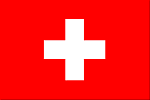The information in this page is old and has not been verified. It should be considered as a starting point for research, and not a definitive resource. If you have any recent information to improve the accuracy of this page, please contact us.
Switzerland
| Law Summary | Ordinance on Beverage Container Packaging puts a deposit on refillable and excessively wasted non-refillable containers, to reduce the amount of beverage containers in the municipal waste stream |
|---|---|
| Date Implemented | November 1, 1990 |
| Containers Covered | Refillables, One-way containers that exceed a maximum amount in the waste stream (by weight) |
| Beverages Covered | All beverages in refillable containers, one-way soft drinks, beer and mineral water |
| Refundable Deposits | Refillable glass (mandatory):
|
| Fees / Taxes | Aluminum cans: U.S. 4¢ per can to cover the costs of collection and recycling (voluntary) |
| Program Success | Containers are recovered at the following rates:
Refillables comprise the following portions of the following markets:
|
Details
Under Switzerland law, all refillables must carry a deposit. One-way beer, soft drink and mineral water containers that exceed a maximum amount (by weight) allowed in the waste stream will require deposits. Currently, all container types are within the maximum allowable amount. The law also requires that refillables display an indication of refillability and the amount of the deposit on the label.
Updated
February 14, 2008

